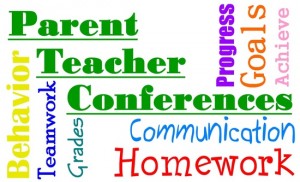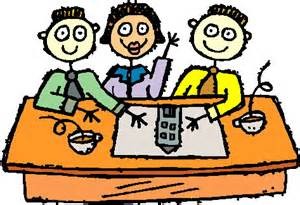
A prepared parent with a positive attitude and an open mind is on the right track for creating a successful, year-long partnership with your child’s teacher. Here are some talking points and questions to get the most out of your conference:
Child Information
Start the conversation by talking about the most important topic: your child.
May I Tell You About My Child?
No one knows your child better than you do, so it’s your job to help your child’s teacher learn more. “Provide your child’s teacher with more information on what motivates your child, likes and dislikes, special skills, strengths and weaknesses.”
May I Tell You About What’s Going on at Home?
Situations like illness, divorce or a new baby may affect your child’s school experience, so inform your child’s teacher of such circumstances.
How Is My Child Doing Socially?
“How the child functions socially in the class” is a topic that should be addressed at a conference, so inquire about your child’s peer relations.
How Is My Child Doing Emotionally?
It’s also important to ask about your child’s emotional health at school. For example, is your child generally happy?
In What Areas Does My Child Need Improvement?
Your child’s teacher sees him from a different perspective than you do. Ask the teacher what personal weaknesses your child needs to work on, and listen to the response with an open mind.
What Do You Think My Child Is Particularly Good at?
Find out about the good stuff, too. Ask about “personal strengths that will extend beyond school,”.
Academic Performance
Now move onto more school-specific questions.
Is My Child Performing on Grade Level?
At a conference, parents should expect to see examples of their child’s work. Parents should ask “how this compares to grade-level expectations, but don’t try to compare your child to other students.” Each child is different and has different strengths and learning abilities.
What Do These Assessment Results Really Mean?
When it comes to standardized testing and other assessment results, “Don’t feel bad about asking ‘What does this really mean?’ Increasingly, assessments are given for school-level progress-monitoring purposes, and it’s best not to get too worked up about precisely interpreting every detail.”
Is My Child Doing His/Her Best?
No matter where your child ranks in relation to grade-level, one important analysis of his performance is whether he’s putting forth his best effort. Does the teacher get the sense that your child is slacking off or not focusing?
Does My Child Need Extra Help in Any Areas?
Your child’s teacher can tell you if your child is falling behind in a skill or a subject. Armed with that information, you can create a plan with your child to work harder in that area, before it gets too late.
What Can We Do to Provide That Extra Help?
“Work with your child’s teacher to create a plan to help your child progress well in school.” There may be specific things that you can do at home to help, such as hiring a tutor or helping with homework.
Tricky Situations
If your child is having problems in school or with the teacher, address them head-on.
May I Share a Concern?
If you’re worried about a situation at school, bring it up with the teacher. “The worst thing parents can do is just wait and wait and wait,”. Teachers usually appreciate when parents bring an issue to their attention, as long as it’s done with respect.
Can You Fill Me in on This Situation?
When your child has complaints about what’s going on at school, “Ask for clarification from the teacher; often your child’s side is the only side you’ve heard.”
Can You Tell Me About Your Teaching Method?
If you have an issue with the teacher’s method, ask her to help you understand it. “Ask your child’s teacher for more information about the teaching method, how it can help your child and what the teacher can and will do if the method does not work with your child.”
Do You Have Any Advice?
If you need help with an issue your child is having, ask the teacher for input. “Teachers have worked with dozens or hundreds of students, and many have sage advice to share,” recommends Baeder.
General Information
End the conference with these useful queries.
How Can I Help?
Parents please ask, “What can I do to support you in the classroom?” There might be supplies you can purchase, prep work you can do at home or other ways you can assist in the classroom.
How Can I Contact You? It’s also good to know how to get in touch with your child’s teacher, so find out whether he or she prefers emails, phone calls or written notes.
Taken from 20 Questions to Ask During a Parent-Teacher Conference

